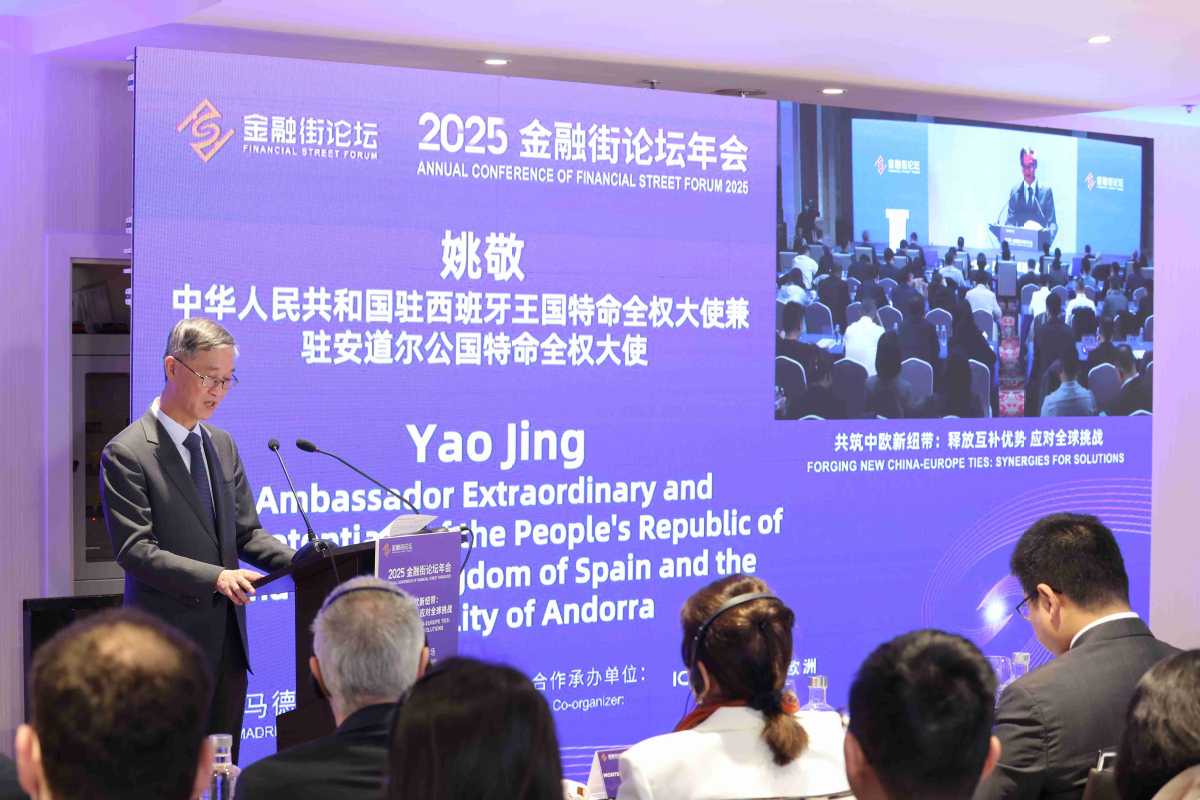China-Europe cooperation achieves economic breakthroughs at Financial Street Forum


The recently concluded Annual Conference of the Financial Street Forum marked a milestone by incorporating five international sub-forums for the first time. Among them, the Madrid sub-forum emerged as a crucial platform that integrated pragmatism and foresight to enhance China-Europe financial cooperation and industrial synergy.
Hosted by the Industrial and Commercial Bank of China's Madrid branch, the sub-forum convened influential figures from leading Chinese and European financial institutions, tech startups, private equity firms and academic think tanks.
Through cross-sector dialogue and complementary resources, the sub-forum became a catalyst for China-Europe collaboration, shifting from isolated projects to systematic coordination.
Centered on financial and investment cooperation, the event represented a breakthrough from conceptual consensus to delivering actionable outcomes. Experts and institutional representatives from both regions discussed how finance can empower the real economy, advocating for accelerated two-way technology transfer and standardized co-construction through tools like industrial funds, mergers and acquisitions financing and cross-border investments.
"China-Europe cooperation has entered a new phase of deep integration between the industrial and financial value chains," said Yang Kaiyu, president of ICBC's Madrid branch.
On the green development front, representatives from institutions such as the Hungarian National Bank and the London Stock Exchange Group reached consensuses on green bonds, ESG investment, and information disclosure standards, propelling China-Europe sustainable development cooperation from policy alignment to standard coordination.
Additionally, the sub-forum's dialogue on artificial intelligence addressed global challenges such as algorithm transparency, data compliance, and cross-border risk management, exploring new pathways for digital collaboration.
Reflecting on the significance of the Financial Street Forum, Yang emphasized its evolution from a platform offering Chinese solutions to one that drives international collaboration, with its overseas venues serving as bridges.
"The overseas sub-forums offer economies at different development stages – and with diverse institutional backgrounds – an opportunity to align local needs with global perspectives," he said.
Looking ahead, the forum aims to strengthen its connection mechanisms between emerging markets and global resource allocation, linking multilateral development institutions, sovereign funds, and private equity to explore replicable inclusive financing solutions.
"I believe that as its global influence continues to expand, the forum will connect more countries and regions to collectively contribute financial solutions to the world's green, digital, and inclusive development," Yang said.
The forum will also enhance institutional and resource coordination among international financial centers. Building on Beijing Financial Street's strengths in fintech innovation and capital market reform, it seeks to deepen cooperation with global financial centers, fostering an open and fair business environment for enterprises.
"We hope the forum will further facilitate exchanges between China and Europe, governments and enterprises, and banks and enterprises, while advancing deeper institutional and resource coordination with other global international financial center cities," Yang said.
This initiative aims to ensure high-quality financial resources are allocated toward innovation and sustainability, he added.
Highlighting the unique advantages of China-Spain cooperation, Yang noted that Spain's pioneering experience in wind power development, low-carbon materials, and EU market standards complements China's strengths in complete industry chains, technological iteration, and large-scale manufacturing.
This synergy can unlock enormous potential in third markets such as Latin America, Africa and the Middle East, he added.
Leveraging ICBC's global network, spanning 69 countries and regions, the bank is poised to activate cooperation strategies. These include building a global settlement network that integrates domestic and overseas operations, renminbi and foreign currencies, and online and offline services, thereby reducing cross-border capital flow costs.
Additionally, ICBC plans to offer customized financing solutions, such as forming syndicated loans with Chinese and European banks to provide long-term funding support for renewable energy and low-carbon infrastructure projects in third markets.
The bank also aims to establish comprehensive risk management and capital market solutions, covering exchange rate and interest rate risk management, cross-border mergers and acquisitions, and overseas bond issuance.
For Chinese new energy vehicle, lithium-ion batteries, and photovoltaic enterprises expanding into Europe, ICBC is developing an end-to-end financial service system.
This system encompasses investment and factory setup, operation management, and capital repatriation, offering strong financial support for Chinese green technology enterprises seeking deeper integration into the European market, Yang said.




































